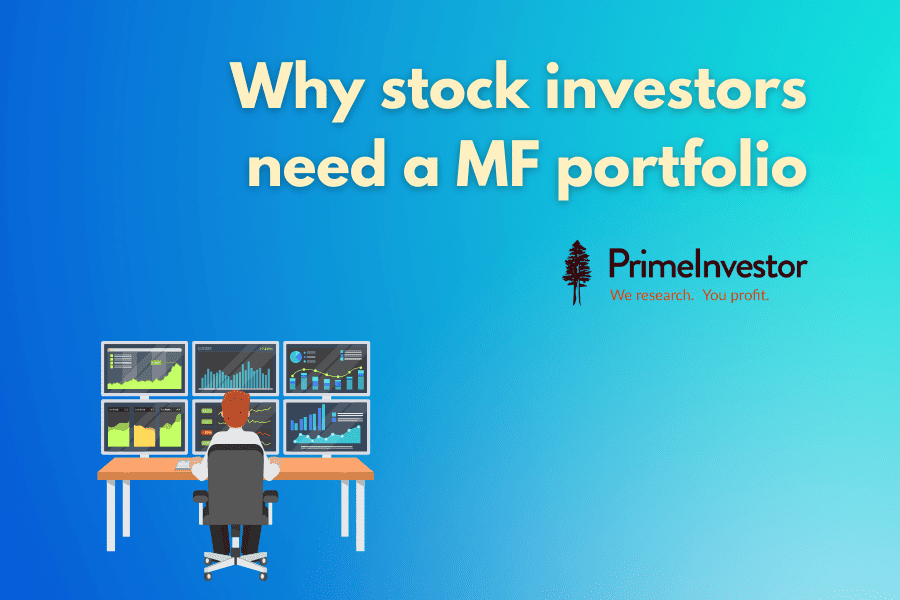Many new stock investors who have opened demat accounts in the past three years seem to be leap-frogging straight into stock investing, without owning any mutual funds. Given that you’ve invested in stocks for your wealth-creation journey, why would you need mutual funds let alone a MF portfolio? Well, we believe that mutual funds should make up the foundation of your portfolio, with stocks being the add-ons. Here’s why.

Early start with MF portfolio
One of the less-known methods to retiring wealthy, is to amass significant capital in the initial few years of your career. After getting to a corpus of Rs 1 crore or so, compounding takes care of wealth creation without your having to do much. But to get to that kind of corpus by your early 40s, you need to start investing in equities in your twenties and be disciplined and regular in your investments. Doing this is easier using mutual funds, than with individual stocks.
In the compound interest formula (A=P*(1+R/100)^N), most folks think the critical variable is R or the rate of return. In truth, it is N - the number of years you stay invested. If you start investing in an equity fund returning 12% CAGR at 33, to get to a Rs 1 crore corpus by 43 (10 years) you’d need to invest Rs 44,000 per month. But if you start when you’re 23, you’d need to invest just Rs 11,000 per month to get to Rs 1 crore by 43.
For folks in their early twenties who are still figuring out their career path, it’s very important to focus on honing their skills at their chosen profession and making an impact at work. Getting into direct stock investing at this stage of life can prove a big distraction from work, as equity research needs a lot of study and tracking of the markets.
Starting SIPs with equity funds (even index funds) can give you a head start on equities, without the distractions and the stress of stock investing. By leaving your investing to professional MF managers, you can side-step newbie mistakes in equities. After 3-5 years of experiencing and understanding equity markets via mutual funds, you can take up direct stock investing and may even do much better at it.
Meeting fixed goals
Most folks who invest in the stock market nurse dreams of amassing big riches. All of us want to retire rich, but we also need to think about life goals that will crop up over the next 3, 5, 7 or 10 years that will need planning for.
Direct stocks are not a great option for meeting goals with fixed timelines, especially within the next 5-7 years. Typical market cycles in India (from bull phase to bear phase and back up) last 5-6 years. If you rely on your direct stock investments to meet goals with 5 or 7- year timelines, the market could be in a slump when you need to withdraw your money. There are many quality stocks in India that have spent even 7 to 10 years in hibernation.
An MF portfolio will come in handy for investing towards specific goals. For upto 5-year goals, you can use debt mutual funds. For 5 to 7-year goals, hybrid funds that mix equity and debt can work. Even for longer term goals that extend beyond 7 years, equity mutual funds can deliver steadier returns than a personal stock portfolio.
Equity funds are managed by professionals who track markets 24/7 on your behalf. They use both position-sizing and risk control tools such as capping individual holdings at 10%, rebalancing and sectoral diversification which you may not find it easy to do, as a retail investor. You may be surprised to know that even professional portfolio managers and star equity investors, maintain personal mutual fund portfolios to meet fixed goals.
Most retail folk who dabble in stocks, tend to have a start-stop approach. When there’s a bull market on and their stock bets pay off quickly, they are fascinated by equities. When markets go into a corrective mode, they completely lose interest and stop looking at their equity portfolio. But bear markets are actually the best time to invest in stocks and that’s when long term wealth from equities is created.
Equity mutual funds offer you a disciplined way to stay your course, via Systematic Investment Plans (SIPs). While some folks do SIPs in stocks, we believe SIPs are a sub-optimal route for individual stocks. We recommend well-timed lumpsum investments in researched stocks. (Read why here https://primeinvestor.in/varsity/sips-in-stocks-should-you-go-for-it/)
Asset allocation
A lot of your portfolio returns in the long run are decided by asset allocation – how much of your portfolio is parked in equity, debt, gold and emergency assets like FDs. Every financial expert worth their name, asks you to start your investing journey with an asset allocation plan, suited to your risk profile.
Asset allocation is personal decision and it is easier when you take the mutual fund route. With open-end mutual funds, you can set up a personalised asset allocation using equity funds, debt funds, gold ETFs and even international equity funds. As mutual funds offer anytime liquidity, you can also rebalance easily between assets as you should, based on your returns, risk profile and life situation.
Trying to run an asset allocated portfolio with exposures to stocks, bonds, gold and international equities using individual instruments is tough. Suppose you have a Rs 25 lakh portfolio and want a 60:30:10 allocation between stocks, bonds and gold, you may not find enough stock ideas or bond issues to deploy your money at one go. Rebalancing when you need to can be difficult as some of your instruments (bonds or SGBs) may have lock-in periods.
Therefore, it makes sense to use an MF portfolio for your asset-allocated core portfolio. You can layer on researched stock or bond picks as a kicker to your returns.
Tax efficiency
When you manage an individual stock portfolio, you will need to actively trim underperformers and replace them at periodic intervals. When you sell or rebalance your holdings as a direct stock investor, you become liable to pay short-term or long-term capital gains tax. Capital gains tax rates are no longer investor-friendly after tax changes in recent years.
Mutual funds are treated as pass-through vehicles by Indian tax laws. Therefore, when the fund buys or sells stocks, or rebalances the portfolio between different assets, the fund is not liable to pay any tax. As long as you stay invested in a mutual fund, you reap the benefits of such rebalancing or replacement on its stock holdings in your fund returns, without becoming liable to paying capital gains tax. It is only when you decide to sell your fund that your tax liability gets crystalised. Mutual funds in your core portfolio can help reap the benefits of this tax-efficiency.
When MF investors need direct stocks
The above points explain how direct stocks investor can gain from having a core MF portfolio. What about the converse? If you own a MF portfolio, do you also need to invest in individual stocks? You can do so, for the following reasons:
- You have the risk appetite to take more concentrated bets than MFs are allowed to. Equity funds are required to cap their individual stock exposures at 10% and they cut back on holdings if their holdings hit this limit. As a stock investor with a high-risk appetite, you may like to let your winners run.
- You’d like to focus more on certain segments of the market – such as microcaps or small-caps. Mutual funds are required by SEBI rules to strictly define the market cap segments they will invest in and invest only in them irrespective of market conditions. If you prefer a far more flexible approach or want a higher allocation to one market segment, you can do it through a direct stock portfolio.
- You have special knowledge of, or interest in a certain sector or segment and would like to own more exposure to it. A diversified fund may not offer such exposure.
- In the open-end structure, performing mutual funds tend to expand over time to a large size. Very large-sized funds in the Indian market suffer from some minuses. They cannot build meaningful positions in micro and many small-caps because of impact cost. They also cannot own stocks with low float or thin liquidity as exit from such positions can cost them dear. As an individual investor, you are free to take a long-term view and buy stocks with low float, thin liquidity or low market cap if they demonstrate good fundamentals. You can choose to time your sells to market highs rather than lows.
- In the stock markets, buying low and selling high adds significantly to your long-term results. You may practise this with mutual funds, but other investors may not. History shows that many retail investors pour money into mutual funds at market highs based on high past returns from a category. They pull out money when returns turn negative. As a mutual fund is a pooled vehicle, you can hurt by the unwise actions of other investors. A fund manager receiving huge inflows into a smallcap fund at market highs will be forced to deploy that money at peak valuations. Pullouts after negative returns can tie the fund managers hands, when it comes to buying during bear markets. As an individual stock investor, you can behave very differently from the crowd, and add to your investment returns.
PrimeInvestor’s Prime Stocks recommendation does away with the need for you to spend on researching companies and markets.







8 thoughts on “Why stock investors need a MF portfolio”
Before attending a value investing course, my holding was 100% equity. I applied my learning to understand the companies that I already invested in.
It took close to 2 months to write a thesis (not more than 300 words).
Now I trimmed my direct equity exposure to 30% (mostly companies in Nifty 50, which don’t have less volatility).
Thank you for sharing, I am happy that I have made the right decision.
Feel it’s a sensible decision.
Would you mind sharing the details about the value investing course? Who conducted it, what were the fees?
Would you recommend it to others?
Highly useful and valuable advice to newbies in the stock market. Congrats & Thx
Thank you!
Well Articulated Madam.
Doing SIP in a flexi-cap, a Hybrid and two debt funds(medium and long term, Corporate bond).
Gold ETF and Silver ETF – for hedging or asset allocation
Liquid fund and FD for emergency purpose.
All above (except few) are our PrimeInvestor suggested funds. It makes me to feel better when compare to other options .
SBI Magnum Medium Duration Fund is what, I picked own for medium term purpose but NOT sure my pick is right 🙂
Regards , Vijay
Good choices 👍
Nice one. Thanks for this fair article.
Comments are closed.